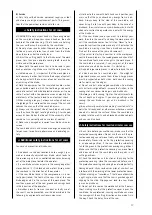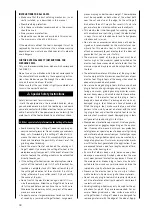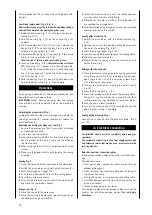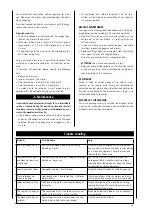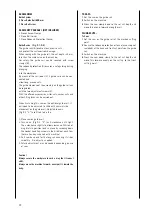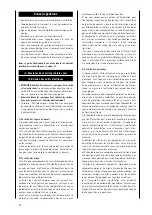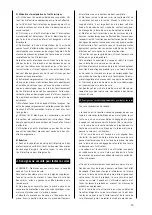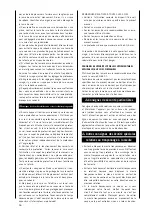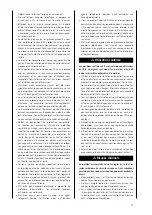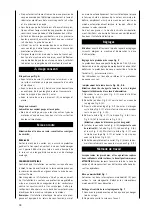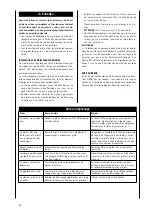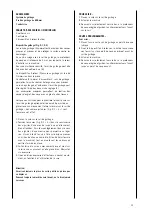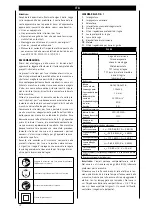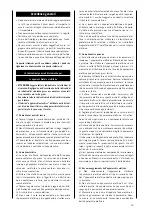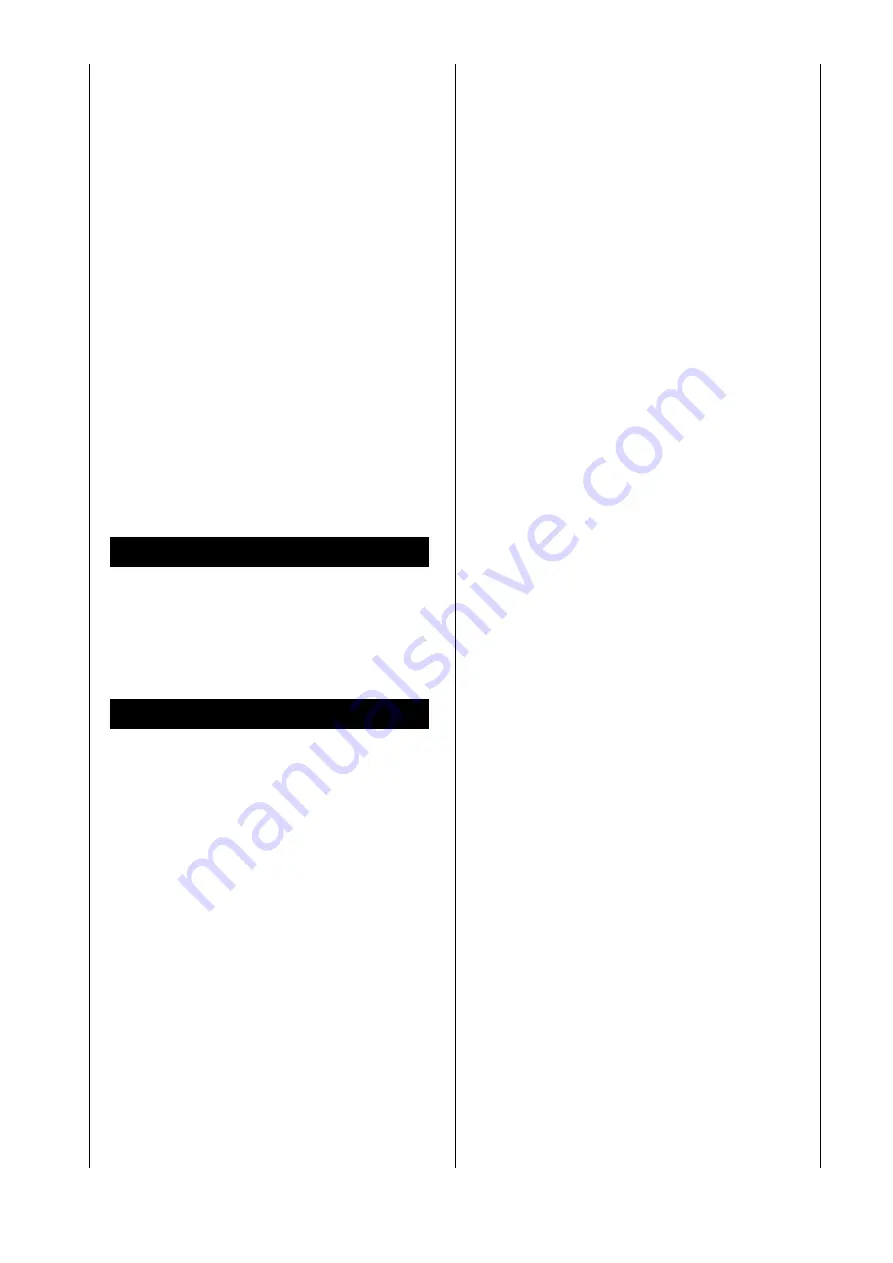
18
pieces may sag under their own weight. The workpiece
must be supported on both sides of the wheel both
near the cut and also at the edge. As the cutting-off
disk enters the cut it may suffer recoil if it cuts into
gas or water pipes, electric cables or other objects.
• This electric tool is not designed for sanding, working
with wire brushes or polishing. Use of the electric tool
in ways it was not intended could lead to dangerous
situations and injuries.
• Do not use any accessories which have not been de-
signed and recommended by the manufacturer spe-
cifically for this electric tool. Just because you can
attach an accessory to your electric tool, this does not
guarantee that you can use it safely.
• The maximum speed of the plug-in tool must be at
least as high as the maximum speed specified on the
electric tool. Accessories which rotate faster than the
maximum speed may break and be catapulted out of
the tool.
• The external diameter and thickness of the plug-in tool
must comply with the dimension specifications of your
electric tool. Plug-in tools of the wrong size cannot be
adequately screened or checked.
• Do not use damaged plug-in tools. Before use, check
plug-in tools such as grinding/sanding wheels for splin-
tering and cracks, grinding/sanding disks for cracks,
wear or heavy wear, and wire brushes for loose or bro-
ken wires. If the electric tool or the plug-in tool is
dropped, check whether it is damaged or use an un-
damaged plug-in tool. When you have checked and
fitted the plug-in tool, make sure that you and other
persons in the vicinity are not on a level with the rotat-
ing plug-in tool and allow the electric tool to run for
one minute at maximum speed. Damaged plug-in tools
will generally break during this test time.
• Wear personal protection equipment. Use face guards,
eye protection or goggles depending on the applica-
tion. If reasonable, wear a dust mask, ear protection,
safety gloves or special aprons to keep small grinding
and material particles away from you. Protect your eyes
from flying foreign bodies which may be created by a
range of applications. Dust masks or respiration masks
must filter the dust generated by the application. If you
are exposed to loud noise for a lengthy period of time,
you may suffer hearing loss.
• Ensure that others keep a safe distance away from
where you are working. Anybody who enters the area
must wear personal protection equipment. Pieces of
the workpiece or broken plug-in tools may be cata-
pulted into the air and cause injuries even outside the
immediate vicinity of where you are working.
• Never use the electric tool in the vicinity of inflam-
mable materials. Sparks may ignite these materials.
• Do not use any plug-in tools which require liquid cool-
ant. Use of water or other liquid coolants could result
in electric shocks.
• Grinding/sanding wheels may only be used for the ap-
plications for which they are recommended. For ex-
ample: Never grind/sand a side surface area with a
cuttingoff wheel. Cutting-off wheels are designed for
removing material with the edge of the wheel. Apply-
INSTRUCTIONS FOR ALL SAWS
• Make sure that the dust catching mechanism is cor-
rectly installed, as is described in this manual.
• Wear breathing protection.
• Only those saw blades recommended in the manual
should be used.
• Always wear ear protection.
• Replace the saw blades as described in this manual.
• The maximum cut depth is 30,5 mm.
If the electrical cable of this tool is damaged it must be
replaced by the manufacturer or the customer service
department or a similarly qualified specialist in order to
avoid dangers.
FURTHER SPECIAL SAFETY INSTRUCTIONS FOR
CIRCULAR SAWS
Only use the recommended saw blades which correspond
to EN 847-1.
Do not use any saw blades which do not correspond to
the characteristics described in these operating instruc-
tions. Saw blades may not be brought to a stop by pres-
sure on the machine from the side.
Make sure that the saw blade is tightly assembled and
turns in the correct direction.
m
Special Safety Instructions
Safety instructions for circular saws
- Hold the equipment on the insulated handles, when
you undertake work in which the tool being used could
come into contact with hidden electrical wires, or its own
cable. Contact with a live power source can electrify the
metal parts of the tool and lead to an electrical shock.
m
Other special safety information for cutting-off wheels
• Avoid blocking the cutting-off wheel or applying ex-
cessive contact pressure. Do not make any excessively
deep cuts. Overloading the cutting-off wheel will in-
crease the stress on it and its susceptibility to jam or
block and therefore the possibility of recoil or of the
grinding wheel breaking.
• Avoid the area in front of and behind the rotating cut-
ting-off wheel. If you move the cutting-off wheel in the
workpiece away from yourself, in the event of recoil the
electric tool and the rotating wheel may be catapulted
directly towards you.
• If the cutting-off wheel jams or you interrupt your work,
switch off the tool and hold it still until the wheel has
reached a complete standstill. Never attempt to pull
the cuttingoff wheel out of the cut whilst it is still ro-
tating, otherwise it may suffer recoil. Find and rectify
the cause of the jam.
• Do not switch the electric tool on again whilst it is in-
side the workpiece. Allow the cuttingoff disk to reach
its full speed before you continue the cut with care.
Otherwise the wheel may catch, jump out of the work-
piece or cause recoil.
• Support panels or large workpieces to reduce the risk
of recoil by a jammed cuttingoff wheel. Large work-














